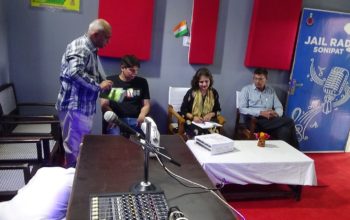The newly constructed District Jail in Nuh, Haryana was inaugurated by Manohar Lal Khattar, Chief Minister of Haryana on 14th February, 2021.
The prison building is situated in Salamba village, and is constructed over an expansive area of 29 acres. It has the capacity to lodge over 1000 inmates. The jail has been built by the Haryana Police Housing Corporation, and is the 20th district jail in the entire state.
The location of the jail is in close proximity to the Mini-Secretariat office in the village. This will ensure that district officials can keep track of the activities in the prison, and are able to guarantee immediate assistance to the jail staff and inmates, if necessary. The accessibility of the jail is beneficial for the families of prisoners as well. It will also reduce the burden on the police officers as they no longer need to travel long distances to escort inmates for their hearings and medical emergencies.
According to Manohar Lal Khattar, Rs 68 crores were spent to build the Nuh Jail. Three boundaries have been built for the security of the jail, supplemented with six watch towers for observational purposes. According to officials, there are three special security rooms of different capacities, a hospital with 30 beds, a hostel of the wards, an electrical substation, along with 69 houses of various categories for officials placed in Nuh prison, among other facilities. The jail also includes a library and a canteen. In addition to these, there will be one wastewater treatment plant of 1.25 million litres per day capacity. All the facilities of the newly-constructed jail were planned in-house, including one underground water tank of 500,000 litres capacity to meet any emergency, and seven rainwater harvesting wells.
Harinder Singh, Superintendent, Bhondsi Jail, mentioned that the Nuh jail would also have its own bakery and training centres to encourage the inmates to develop necessary skills. These have been planned so that when the inmates are released, they are able to stand on their own and take care of their families. Muhammad Akil, Director General, Haryana Police, added that Nuh prison was initially expected to start operations in 2018, but due to a host of factors such as the Covid-19 pandemic, the completion of this project had got delayed. “Now, finally we are starting the operation and by the month of April, inmates will be shifted to the new prison,” he said.
Police officials claim that this new facility will surely reduce the pressure on Gurugram’s Bhondsi Jail and the Faridabad Jail. These jails are gravely overcrowded in relation to their capacity.
An exclusive workshop on prison reforms, under the chairmanship of CM Khattar, was also organised after the inauguration ceremony. It was attended by all the senior jail officers. Five high dignitaries with ground experience were chosen to give special inputs on prison administration and prison security. These are – Sandeep Goel, IPS, DG Delhi Prisons, Dr. Vartika Nanda, Founder, Tinka Tinka Foundation, Dr. Upneet Lalli, Deputy Director, ICA, Dr. KP Singh, IPS (Rtd. DGP), and Dr. Himanshu, Medical Officer.
The workshop offered a historic opportunity to jail officials and staff members to interact on a one-on-one basis on various aspects of prison reforms, including prison security, welfare and rehabilitation of inmates, training and personnel management of prison officials, coordination in the criminal justice system as well as health and hygiene of inmates. Chairing the workshop, CM Khattar emphasised the need to pay inclusive attention towards the mental, religious and social development of inmates and highlighted the distinct transformation of jails in Haryana into correctional facilities. “Rigorous work is being done in the direction of bringing in behavioural changes of the prisoners so as to make them good citizens by converting Jails into Correctional Homes,” the Chief Minister added.
As a part of this distinguished workshop, media educator and prison reformer, Dr. Vartika Nanda, delivered a special presentation on ‘Welfare and Rehabilitation of Prison Inmates’. She also highlighted the noteworthy contribution of her prison reforms movement, Tinka Tinka, in bringing radio to 12 out of 19 jails in Haryana. Dr. Nanda laid emphasis on the potential of radio in ensuring a holistic development and rehabilitation of inmates to integrate them into the mainstream societal fold.
“Haryana Prison Radio is, by far, the most structured and systematic prison radio in India. This unique Tinka Tinka Model of Prison Reforms can be extended to jails across the country to change the lives of inmates through an educational and creative process,” said Dr. Vartika Nanda. She made several recommendations, including the inclusion of prison radio among the best practises for the welfare and rehabilitation of inmates in prison manuals across the country.
The workshop was a successful endeavour that brought together prominent members of the civil society, including administrators and academicians on one platform to deliberate and introspect to move closer to the goal of prison reformation. The special focus on the various technical, educational and cultural dimensions of prison reforms during the workshop opened new avenues of discussion. Inaugurated in the backdrop of this dialogue, the newly inaugurated District Jail, Nuh, is expected to be another step forward in addressing the issues of overcrowding in jails.
( The authors of this article are final year students, Department of Journalism, Lady Shri Ram College for Women, University of Delhi )


